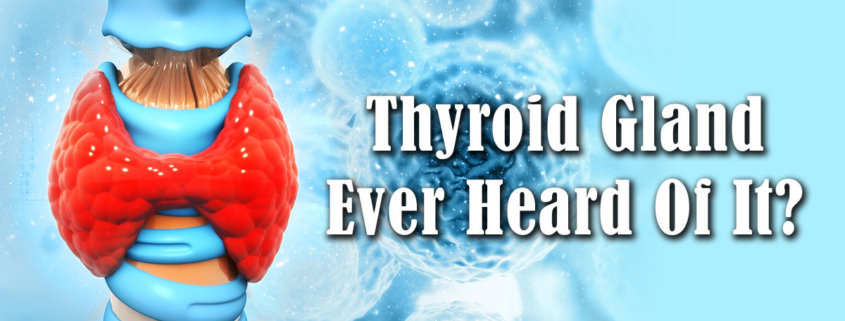THE THYROID GLAND; HEARD OF IT, NOT SURE WHAT IT IS?
There are 14 major glands in the human body essential for conducting a wide range of key biological processes. The thyroid gland is one of them. Your thyroid is a small, butterfly-shaped gland situated at the base of the front of your neck, just below your Adam’s apple, which although not noticeable, is in women, too. Hormones produced by the thyroid gland — triiodothyronine (T3) and thyroxine (T4) — have an enormous impact on your health, affecting all aspects of your metabolism. These hormones also regulate heart and digestive function, muscle control, brain development, mood and bone maintenance.
HOPING YOU’RE NOT HYPO
If you’re like a lot of people, when you hear “thyroid”, you hear people who gain weight claiming that their thyroid must be low. Yeah, yeah, you might have thought, thinking that pizza and cheese puffs were the more likely culprit. Well, weight gain is one of the symptoms of what is called hypothyroidism or under active thyroid, a condition in which your thyroid gland doesn’t produce enough of certain crucial hormones.
Hypothyroidism signs and symptoms may include:
- Fatigue
- Increased sensitivity to cold
- Constipation
- Dry skin
- Puffy face
- Muscle weakness
- Elevated blood cholesterol level
- Muscle aches, tenderness and stiffness
- Pain, stiffness or swelling in your joints
- Heavier than normal or irregular menstrual periods
- Thinning hair
- Depression
- Impaired memory
-
And yes, weight gain
HYPERTHYROID: MORE THAN HYPER ACTIVE
Another condition called hyperthyroidism or overactive thyroid, occurs when your thyroid gland produces too much of the hormone thyroxine. As with hypothyroidism, this condition can mimic other health problems, which can sometimes make it difficult to diagnose. Like hypothyroidism, it can also include a wide variety of signs and symptoms including:
- Unintentional weight loss
- Rapid heartbeat
- Irregular heartbeat
- Increased appetite
- Nervousness, anxiety and irritability
- Tremors
- Sweating
- Changes in menstrual patterns
- Increased sensitivity to heat
- Fatigue, muscle weakness
- Difficulty sleeping
- Skin thinning
- Fine thinning hair
FOODS THAT CAN FIDDLE WITH YOUR THYROID FUNCTION
You might be surprised to learn that fatigue, sudden weight gain or loss, or that general “blah” feeling is the result of foods that can impact how your thyroid works. Depending on whether your thyroid is hypo or hyper, these are just some foods that can either help or hinder your thyroid hormones:
- Kale
- Gluten
- Cabbage
- Brussel sprouts
- Soy milk
- Whole wheat bread
- Sugary foods
- Processed foods
- Caffeine
- Iodized salt
- Seaweed
- Leafy greens
- Nuts-Brazil are best
- Seafood
- Yogurt
- Milk
- Chicken and beef
- Eggs
- Berries
If you do have a thyroid condition, you might want to look into it further.
GET THE UPPER HAND ON YOUR THYROID GLAND
Hypo…hyper…when your thyroid hormones are out of balance at all, it’s easy to feel less than your best. All you have to do is look at some of the effects a thyroid imbalance can blast your body with. But before you worry too much, it might help to know that an estimated 20 million Americans have some form of thyroid disease. Up to 60 percent of those with thyroid disease are unaware of their condition. Which means you could be one of them. So how do you get your thyroid hormones where they’re supposed to be? You make an appointment to see the most experienced hormone specialists in the Denver area; Denver Hormone Health. If it has anything to do with any of the 50 hormones—thyroid included—in the human body, the experts at Denver Hormone Health know exactly how to get them functioning at full speed. Simple tests will tell them where your thyroid levels stand, and from there they create a treatment plan tailored to your specific needs. Let Denver Hormone Health get you back on the path to feeling fit and fabulous. Your thyroid will thank you.




